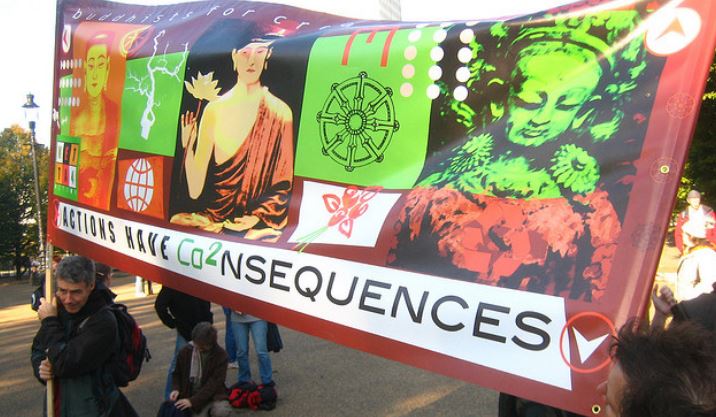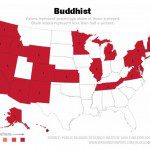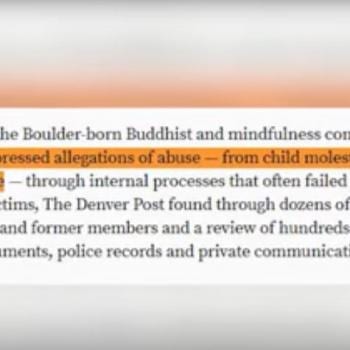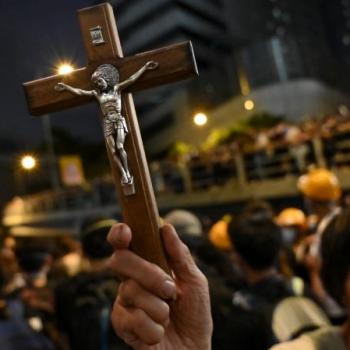 The Resource Innovation Group (TRIG), a non-profit organization affiliated with the Sustainability Institute at Willamette University, has asked faith leaders to join a “Call to Action for U.S. and World Leaders to Proactively Address the Adverse Psychological and Social Impacts of Climate Disruption.”
The Resource Innovation Group (TRIG), a non-profit organization affiliated with the Sustainability Institute at Willamette University, has asked faith leaders to join a “Call to Action for U.S. and World Leaders to Proactively Address the Adverse Psychological and Social Impacts of Climate Disruption.”
According to their website, “TRIG’s mission is to address the human causes, impacts, and solutions to complex socio-economic-ecological challenges, with a special emphasis on climate change. By a decision of the TRIG Board of Directors in 2013, TRIG has decided to focus primarily on building psychosocial resilience for climate change-enhanced traumas and stresses within individuals, organizations, communities, and society.”
The call to action, which must be signed by Friday, March 13, states in part:
We the undersigned representatives from the mental and physical health, human services, emergency management, climate change, faith, racial justice, civil rights, and youth communities of the world recognize that climate change is a real, dangerous, and rapidly worsening crisis that is already producing, and will increasingly generate, significant physical, economic, and ecological harm.
Equally important, but often unnoticed, is that climate change creates very serious psychological, emotional, spiritual, religious, moral and social impacts worldwide. Left unaddressed, the mounting psychosocial maladies will diminish the health and wellbeing of individuals, families, and communities everywhere. They are also likely to thwart efforts to cut greenhouse gas emissions, prepare for climate impacts, and reduce climate change to manageable levels. We therefore call on public, non-profit, private, and civic leaders in the U.S. and around the world to quickly recognize the very serious risks posed by climate disruption to the psychosocial health and wellbeing of humanity.
…
There will never be sufficient resources available to treat all of the people impacted by the growing number of these events. The only way to prevent significant psychosocial consequences is to prepare people in advance by teaching resilience skills.
Equally important, but less obvious, is that climate change generates a wide range of chronic toxic stresses. Research has found, for example, that hotter temperatures precipitate increased aggression. Climate-enhanced illnesses and diseases as well as economic disruptions and job losses often trigger anger, depression, and hopelessness. Moral distress, helplessness, and despair will continually rise as people grapple with the physical damage, spiritual, and existential implications of the crisis….

Buddhist leaders and others associated with Buddhist organizations and institutions who have already signed include:
Donald Rothberg, Teacher, Spirit Rock Center
Martin Aylward, Director, The Mindfulness Institute
Taigen Dan Leighton, Rev., Ancient Dragon Zen Gate, Chicago
Gregory Kramer, President, Guiding Teacher, Metta Foundation
John McIlwain Program Director, Climate, Mind, and Behavior, Garrison Institute
Tina Fields, Assoc.Prof and Chair, MA in Transpersonal Ecopsychology, Naropa University
Adam Delp, Student, Naropa University
Joanna Macy, Activist, Teacher, Author, Joanna Macy Intensives
Virginia D Clarkson, Dharma Leader of Insight Meditation Houston, Insight Meditation Houston
Erin Taylor, Insight Meditation Teacher, Original Nature Insight Meditation Wellington New Zealand
Kristin Barker, Co-founder, One Earth Sangha
Bhikkhu Bodhi, President, Buddhist Association of the United States
Noah Levine, Buddhist Teacher, Against the Stream Buddhist Meditation Society
Elizabeth Rice, Teacher, InsightLA
Justin Whitaker, Writer/Educator, American Buddhist Perspectives
Peter Fernando, Buddhist Meditation Teacher, Original Nature Insight Meditation
Jo-ann Rosen, Psychotherapist and Spiritual leader, Tiep Hien Order of Unified Buddhist Church
Leslie Tremaine, meditation teacher, Insight Santa Cruz
Susan Orr, Community Dharma Leader, Sacramento Climate Sangha
Phonchai Phacharin-tanakun, Ph.D., Assistant Professor, Mahamakut Buddhist University
Arinna Weisman, BUDDHIST LEADER/MINISTER, LOTUS SISTERS
John Bell, Dharma Teacher Plum Village, Tradition of Thich Nhat Hanh
Moh Hardin, Acharya, Shambhala International
Cynde Grieve, Sangyum, Shambhala
Birgitte Moyer-Vinding, ordained lay member of the Order of Interbeing, Unified Buddhist Church
Betsy Ponf Shastri, Psychotherapist, Shambhala
David Ostwald, facilitator, Flowing Waters Sangha
Beverly Alexander, Community Leader, Order of Interbeing
Peter Kuhn, Ordained Buddhist Lay Priest, Order of Interbeing, Plum Village Sangha
Willa B. Miller, Spiritual Director Natural, Dharma Fellowship
Cheryl Wilfong, Insight Meditation teacher, Vermont Insight Meditation Center
Access the full letter and signatories here: http://www.












